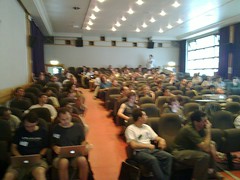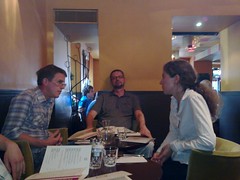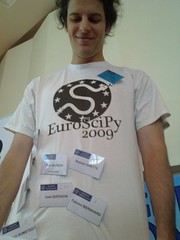Euroscipy 2010, the third European conference for the use of Python in science, is just over, and I think it was a great success.
Euroscipy in numbers

The attendance this year was huge: there was a grand total of 160 who came to EuroScipy, with 140 that came only to the tutorials, and 130 only the conference. This up by almost a factor of 3 compared to last year’s EuroScipy, more than last year’s SciPy conference in Passadena, and almost as much as this year’s SciPy conference in Austin that hosted 180 person. We had people coming from 16 country, and as far as New Zealand, the US, or Turkey. Research lab, education, and industry (small to large companies) were all well represented, with approximately a third of the delegates coming from the industry. Similarly, many different scientific field were discussed, ranging from landscape ecology to pure math.
There were 2 tutorial tracks with 10 tutorial slots in each track. We had 2 keynotes from Hans Petter Langtangen and Konrad Hinsen. With regards to the contributed talks, the conference this year was highly selective. We received 52 propositions. We unfortunately could accept only 30 of them, which corresponds to an acceptance rate of 58%. Finally, we had 18 lightning talks.
A warm and friendly atmosphere

As an organizer, I was really pleased to find out how much people were relaxed and friendly. This certainly facilitates discussions during the breaks. And the ambiance was undoubtedly warm: 140 people with laptops in a room without air conditioning in the Paris summer :).
Of course during the evenings, many people met to continue the passionate discussions in restaurants and bars.
Trends I noticed
What one remembers from a conference is obviously biased by personal interests. With that disclaimer, here are the recurrent and important topics that I noticed, both in the talks, but also in the coffee break discussions:
- Parallel computing, in particular making it easy to do parallel computing. Konrad’s keynote had many interesting directions to explore. (talks: Playdoh, DANA).
- Code generation. In the various conferences I have been to recently, I heard much talking about symbolic manipulation of numerical problems to generate optimal computing kernels (talks: Efficient computation tutorial, Theano, Algorithmic Differentiation.
- Data management, with problems such as provenance tracking for reproducibility (talks: Sumatra, Knowledge management tutorial).
Finally installation problems of scientific tools were the subject of many discussions, as each year. One thing that I did notice, is that people stopped simply blaming each others and acknowledged that nobody knew how to fix the problem. Somebody even pointed out that installing any major scientific code was not a piece of cake. Hans Petter and others said that they had solved the problem by relying on a virtual machine and Ubuntu.
Konrad has also blogged, giving his own view of the conference.

Thanks
The conference could happen only because of the help of many people. First we need to thank our sponsors: Enthought, Python Academy, Pytables, and especially our host Ecole Normale Supérieure, which not only provided us with the rooms, but also made sure that everything was going well with the sound system, the projection, or the access to the building. With regards to organization and planing, Nicolas and I received a lot of help from Emmanuelle Gouillart.
